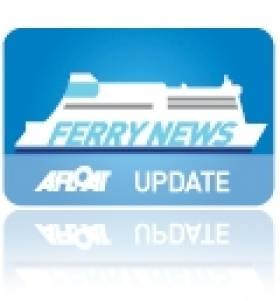Displaying items by tag: New IrelandFranceSpain route
#IrelandSpain – LD Lines new Ireland-France-Spain routes service ferry Scintu is tonight making her maiden inbound voyage to Rosslare Europort with an arrival expected just after 21.00hrs, writes Jehan Ashmore.
As reported last night on Afloat.ie, the Scintu departed St.Nazaire at midnight bound for Rosslare. The ship starts the first ever ferry service linking Ireland-west France and northern Spain. The new route was hailed as a 'valuable new landbridge' by Minister for Transport Leo Varadker when in November he announced the new Irish-Iberian service.
To reflect her new Rosslare-St.Nazaire-Gijon route operations, the 26,904 tonnes Scintu with a capacity for almost 500 passengers and 195 vehicles is to be re-named Norman Atlantic within the month.
Norman Atlantic will operate the 22-hour sailing between Rosslare and St. Nazaire (Montoir-de-Bretagne) on the banks of the Loire. She then continues from the mid-western French port on the second leg of the Irish-Iberian service to Gijón in the Astuarias region of northern Spain.
A sailing schedule sees the 2009 Italian built ferry operate a single weekly round-trip service on the Rosslare-St.Nazaire route in which the first outward bound sailing departs Rosslare tomorrow night at 21.00hrs. In addition the ferry operates two round-trips per week on the St.Nazaire -Gijon 16 hour route.
The Bay of Biscay route will also be served by sister Norman Astuarias which as reported has opened other new routes recently between the UK and Spain. The routes are Poole-Santander and also starting this month a Poole-Gijon route.
Both these new Irish 'Motorway of the Seas' routes linking to France and Spain, will open up a whole new dimension to Irish tourists and freight customers.
The 186m long Norman Atlantic was built by Visentini Shipbuilders. She has comfortable cabins and passenger facilities of a bar, restaurant, shop and lounges.
Currently the ferry does not carry 'foot' passengers on the Rosslare-St. Nazaire and St. Nazaire- Gijón routes, though according to a LD Lines spokesperson this option have not been entirely ruled out.
LD Lines are no stranger to the Irish market, as the French owned company initially imported trade vehicles using the freight-only ro-ro vessel, NMT Elise which also ran from Rosslare. This service also developed into a passenger ferry service that began in 2008 but instead operated to Le Havre.






























































